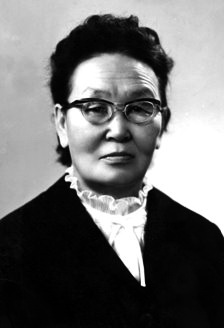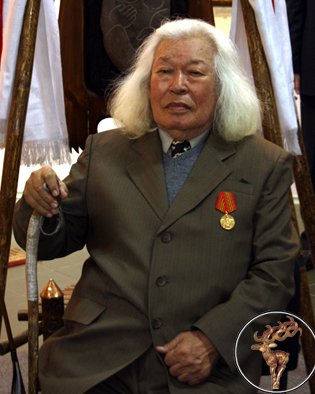Related Research Articles

Overtone singing, also known as overtone chanting, harmonic singing, polyphonic overtone singing, or diphonic singing, is a set of singing techniques in which the vocalist manipulates the resonances of the vocal tract to arouse the perception of additional separate notes beyond the fundamental frequency that is being produced.

Kyzyl is the capital city of the republic of Tuva, Russia. The name of the city means "red" or "crimson" in Tuvan. Its population was 120,067 (2021 Census);
Paul Jerrod Pena was an American singer, songwriter and guitarist of Cape Verdean descent.
Tuva is a part of Russia, inhabited by a Turkic people. Tuvans are known abroad for khoomei (xöömej), a kind of overtone singing.

Huun-Huur-Tu are a music group from Tuva, a Russian federative republic situated on the Mongolia–Russia border. Their music includes throat singing, in which the singers sing both a note and its overtones, thus producing two or three notes simultaneously. The overtone may sound like a flute, whistle or bird, but is solely a product of the human voice.

Sainkho Namtchylak is a singer originally from Tuva, an autonomous republic in the Russian Federation just north of Mongolia. She is known for her Tuvan throat singing or Khöömei.

Tuva or Tyva, officially the Republic of Tuva, is a republic of Russia. Tuva lies at the geographical center of Asia, in southern Siberia. The republic borders the Altai Republic, Khakassia, Krasnoyarsk Krai, Irkutsk Oblast, and Buryatia in Russia, and shares an international border with Mongolia to the south. Tuva has a population of 336,651. Its capital is the city of Kyzyl.

Tyva Kyzy is an all-female folk ensemble performing Tuvan throat-singing, under the direction of Choduraa Tumat. It is the first and only women's group in Tuva that performs all styles of Tuvan throat-singing.

The ensemble Alash is a throat singing band from Tuva, Russia, that performs traditional Tuvan music with some non-traditional influences.

Khertek Amyrbitovna Anchimaa-Toka was a Tuvan and Soviet politician who in 1940–44 was the Chairwoman of Little Khural of the Tuvan People's Republic, and the first non-royal female head of state. She was the wife of Salchak Toka, who was the republic's supreme leader from 1932 to 1973.

Tuvan throat singing, the main technique of which is known as khoomei, is a style of singing practiced by people in Tuva, Mongolia, and Siberia. It is noted for including overtone singing. In 2009, it was included in the Representative List of the Intangible Cultural Heritage of Humanity of UNESCO. The term hömey / kömey means throat and larynx in different Turkic languages. That could be borrowed from Mongolian khooloi, which means throat as well, driven from Proto-Mongolian word *koɣul-aj.
Theodore Craig Levin is an American ethnomusicologist. He is a professor of music at Dartmouth College in New Hampshire and earned his undergraduate degree at Amherst College and obtained his Ph.D. from Princeton University. Levin has focused his research on the people of the Balkans, Siberia, and Central Asia. His recordings from these regions have been released on various labels.
Timbral listening is the process of actively listening to the timbral characteristics of sound.
The Tuvan National Orchestra reflects the complex history of the Republic of Tuva, a federal subject of Russia which sits at the southern edge of Siberia, with Mongolia to its south. Over the centuries, Tuva has been part of Chinese and Mongolian empires, and shares many cultural ties with Mongolia. In 1944 it joined the Soviet Union, and Tuva is now a constituent republic of the Russian Federation.
Sevʹyan Izrailevich Vainshtein was a Russian ethnographer, archaeologist, and historian of Siberian and Central Asian peoples. He was a professor at the Institute of Ethnology and Anthropology of the Russian Academy of Sciences in Moscow.

Mongush Borakhovitch Kenin-Lopsan was a Russian writer, poet, historian, archaeologist, famous Tuvan shamanism researcher, and leader who lived in Kyzyl, the capital of Tuva, Russian Federation.

Aldyn-ool Takashovich Sevek was a master Tuvan throat singer.

Saidash Begzy Oglu Mongush is a Tuvan folk musician from Kyzyl known for his throat singing performance. He is associated with the Tuvan rock band Yat Kha and the folk group Huun Huur Tuu.

Jampel Lodoy, also spelled with variations of Dzhampel Lodoi or Jambal Lodoi, was a Russian Tuvan Buddhist lama who served as the Kamby Lama of Tuva for two tenures. The Kamby Lama, or Supreme Lama, is the highest Buddhist religious authority in Tuva. Jampel Lodoy was first elected Kamby Lama from 2005 to 2010. During the 2010s, Jampel Lodoy became the abbot of Ustuu-Khuree, one of the largest Buddhist monasteries and temples in Tuva, which had been destroyed in 1937, but reopened in 2012.

Chylgychy Chimit-Dorzhuyevich Ondar was a Russian politician of Tuvan ethnicity. From 2001 to 2007, Ondar was a member of the State Duma. He was a member of United Russia.